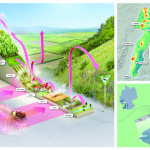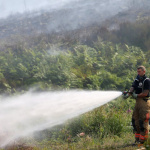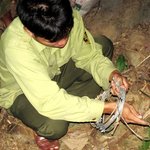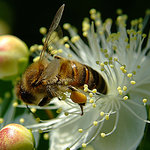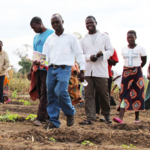The United States is producing affordable food using less energy, less water, and less land than at any time in history, all leading to less environmental strain.
A new study warns Germany they need to be more like America soon. A new analysis found that pesticide pollution is spreading from the lowlands to the Black Forest and the Palatinate Forest. The academics advocate that pesticide use must be reduced in order to protect areas around fields, orchards and vineyards.
The solution to that is modern pesticides rather than what EU green activists insist on, and more genetic engineering,…
Environment
A stark warning about the kind of summer that could become routine in the UK by the end of this century has been issued in a new study by the country’s Met Office.
Using temperature data and climate model simulations, the researchers tested the likelihood of UK temperatures exceeding 30°C, 35°C, and 40°C each summer over the next 80 years.
They found that if global greenhouse gas emissions continue to rise, temperatures exceeding 40°C could be reached somewhere in the UK every three-and-a-half years by 2100.
If you live or have travelled in a hot climate, you might know the stifling heat that…
For decades habitat loss has been the key threat for wildlife in tropical rainforest ecosystems but a new study finds that ground dwelling mammal and bird communities are more impacted by illegal hunting using indiscriminate snares than they are controlled logging.
The researchers conducted a large scale camera-trapping study to compare several forest areas with logging concessions in Malaysian Borneo and protected areas in the Annamites ecoregion of Vietnam and Laos known to be subjected to illegal hunting. The results show severe defaunation in snared forests compared to logged forests.…
Playing to their western environmental allies, Russian groups are claiming bee deaths that occurred recently are due to neonicotinoid pesticides sprayed on oil rapeseed crops.
An article in Russia’s Meteovesti goes on to restate discredited populist claims that the number of domestic bees in the United States has halved in 2015 alone.
The sea and beaches on the Tarragona coast contain plastic similar to those in a big city like Barcelona but it's not water bottles or food containers. It's instead 57 percent clothing fibers from washing machines.
You just can't see it. What they presented was microscopic plastic waste that cannot be seen by the naked eye but which some believed could have an impact on human health in higher quantities. In a series of studies initiated in 2018, they analysed samples of sea water, marine sediment and sand from Tarragona beaches to determine the presence of plastics and their possible source.…
&To predict the fate of species, ecologists use computer models that consider individual species in isolation but reality does not work that way. Species are part of a giant network of mutual dependencies: For example, plants need insects to disperse their pollen and, in turn, insects depend on plants for food.
These types of mutually beneficial interactions have been very important in generating the diversity of life on Earth. But the interaction also has a negative knock-on effect when the extinction of one species causes other species that are dependent on it to also die out, an effect…
Many African higher education institutions are under tremendous pressure to produce innovative research to solve local problems. They are encouraged to produce their country’s next generation of innovators. Scholarly journals and the popular press call on these institutions to drive their nation’s development.
Yet most of them are underfunded and tasked with enormous teaching loads. External donors and their priorities, rather than local demand or need, tend to drive institutions to mimic the work of the developed world. Evidence suggests that these approaches are not effective for deeper…
A team of scholars from Mainz University Medical Center and Goethe University Frankfurt used an experiment to create what they believe is a harmful effect on bees using neonicotinoids in field-relevant concentrations. The effect, they believe, is to reduce the concentration of acetylcholine, a signaling molecule relevant for the development of the honeybee larvae, in the royal jelly/larval food secreted by nurse bees.
At higher doses, neonicotinoids also damaged the microchannels of the royal jelly gland in which acetylcholine is produced. Comparable to neonicotinoids, it stimulates the…
